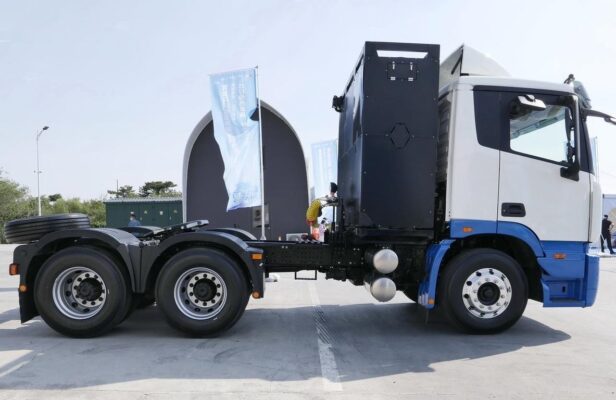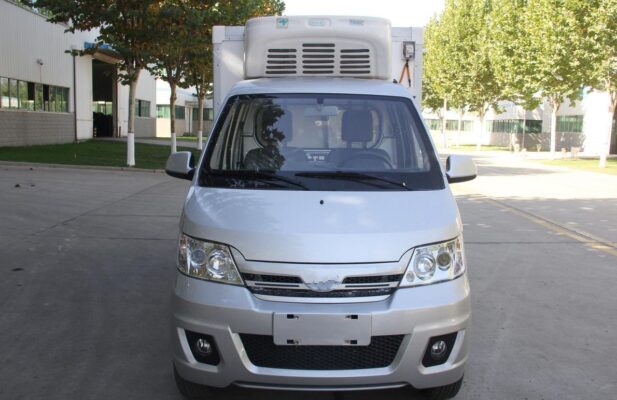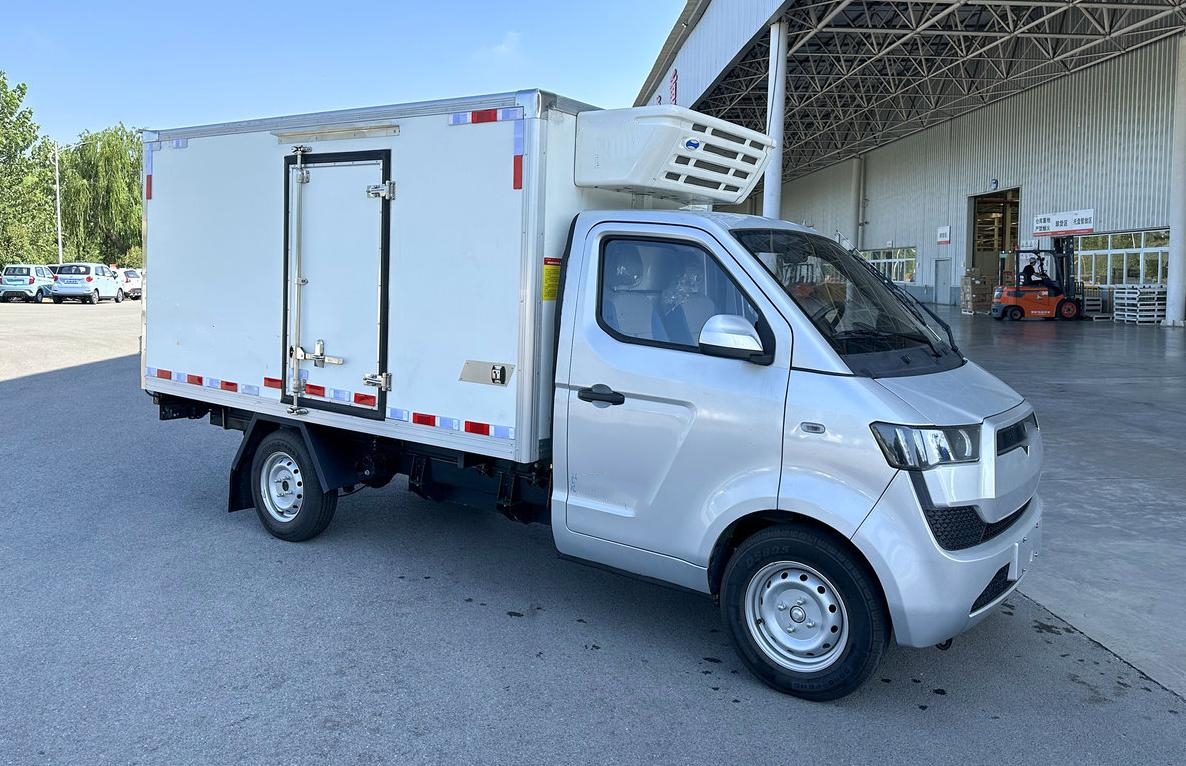Էլեկտրական բեռնատար նորություններ
Why Do People Get Headaches When Riding in Electric Vehicles?
Փակցված է միջոցով Էլեկտրական բեռնատարներ
Վերջին տարիներին, with the increasing global focus on environmental protection, Էլեկտրական մեքենաs have become more and more popular. They are hailed as an environmentally – friendly means of transportation and are gradually becoming a common choice for many people. However, an interesting phenomenon has emerged: some people may experience headaches after riding in Էլեկտրական մեքենածուռ. This has attracted the attention of many researchers and vehicle enthusiasts alike, and understanding the reasons behind this phenomenon is crucial for both improving the user experience of Էլեկտրական մեքենաs and ensuring the well – being of passengers.

Can Riding in an Electric Vehicle Cause a Headache?
It is indeed a fact that some people may get headaches after riding in Էլեկտրական մեքենածուռ. However, it is important to note that this is not a universal experience. Individual differences play a significant role in determining whether a person will be affected in this way. Different people have different sensitivities to various factors related to vehicle travel. For some, riding in an Էլեկտրական մեքենա may be a completely comfortable experience, while for others, it can lead to discomfort and headaches. These individual differences can be attributed to a variety of factors, including physiological differences such as differences in the nervous system’s sensitivity, and psychological factors such as personal preferences and adaptability.

Why Does Riding in an Electric Vehicle Trigger a Headache?
The operation mode of Էլեկտրական մեքենաs is fundamentally different from that of traditional cars. Traditional cars generate power through internal combustion engines. This process involves a series of complex mechanical operations, such as the combustion of fuel, the movement of pistons, and the rotation of the crankshaft. These operations result in a certain degree of jolting and engine vibration during the driving process. In contrast, Էլեկտրական մեքենաs rely on batteries to drive motors. The power output of Էլեկտրական մեքենաs is much more stable, without the characteristic jolting feeling and engine vibration of traditional cars. While this may seem like an advantage in terms of smoothness, it can actually make some people feel uncomfortable.
The human body is accustomed to a certain level of vibration and movement during transportation. The absence of these familiar sensations in Էլեկտրական մեքենաs can disrupt the body’s normal perception and balance mechanisms. Our nervous system is constantly receiving and processing various sensory inputs from the body, and when these inputs deviate from what the body is used to, it can cause a sense of unease. This unease may manifest as a headache in some individuals. Օրինակ, our vestibular system, which is responsible for maintaining balance and spatial orientation, may be affected by the overly smooth driving of Էլեկտրական մեքենածուռ. The lack of the normal jolts and vibrations that it has been accustomed to from traditional vehicles can lead to a miscommunication between the vestibular system and the brain, resulting in symptoms such as headaches.

Is the Suspension System of Electric Vehicles Related to Comfort?
Yes, the suspension system of Էլեկտրական մեքենաs has a definite influence on comfort. Some Էլեկտրական մեքենաs may adopt a relatively hard suspension system to enhance the vehicle’s stability and handling performance. A hard suspension system is designed to keep the vehicle more firmly planted on the road, especially during high – speed driving or sharp turns. This helps to improve the vehicle’s responsiveness and overall driving dynamics.
However, this comes at a cost in terms of ride comfort. A hard suspension system transmits more road irregularities directly to the vehicle’s cabin. When the vehicle encounters bumps, potholes, or other road imperfections, the hard suspension does not absorb these shocks as effectively as a softer suspension would. As a result, passengers may experience more jolting and bouncing during the ride. These sudden and repeated jolts can cause stress on the body, particularly on the head and neck area. The continuous jarring can disrupt the normal physiological state of the body, leading to muscle tension and potentially triggering headaches. Օրինակ, when driving over a speed bump, a vehicle with a hard suspension system will transmit a sharper impact to the passengers, which can be more likely to cause discomfort and headaches compared to a vehicle with a more compliant suspension.

Compared with Traditional Cars, Electric Vehicles Have Less Noise. Is This Related to Headaches?
Indeed, the noise level of Էլեկտրական մեքենաs is relatively low, especially on urban roads. This is mainly due to the absence of the engine noise that is characteristic of traditional cars. For some people, the lack of noise can actually cause discomfort and subsequently trigger headaches.
Many people are used to the presence of road noise, engine roar, and other ambient sounds during vehicle travel. These sounds have become a part of the normal driving experience. In an Էլեկտրական մեքենա, the quietness can be somewhat disconcerting. Our brains are constantly processing sensory information, and the sudden change in the auditory environment can disrupt this normal processing. Some people may unconsciously strain their ears or become overly focused on the absence of noise, which can lead to a sense of unease. This unease can gradually build up and potentially result in headaches. Լրացուցիչ, the lack of background noise can make other, usually less noticeable, sounds more prominent. Օրինակ, the humming of the electric motor or the sound of the wind against the vehicle can seem louder in the absence of engine noise, and this can also contribute to discomfort and headaches for some passengers.

How to Relieve Headaches Caused by Riding in Electric Vehicles?
If you experience a headache after riding in an Էլեկտրական մեքենա, there are several methods you can try to relieve the discomfort. First, adjusting the position of the seat can be very helpful. A proper sitting position can ensure that your body is in a more natural and relaxed state during the ride. You can adjust the seat height, backrest angle, and headrest position to find a position that provides the best support for your body. This can help to reduce muscle tension, especially in the neck and back areas, which are often associated with headache development.
Relaxing your muscles properly is also crucial. You can do some simple stretching exercises before and during the ride if possible. Օրինակ, gently stretching your neck from side to side, forward and backward, can relieve muscle stiffness. During the ride, try to keep your muscles as relaxed as you can, avoiding tensing up due to discomfort or unease.

Listening to music can be an effective way to distract your attention. Choose music that you like and find relaxing. The rhythm and melody can help to shift your focus away from the discomfort and onto the pleasant auditory experience. Music can also have a soothing effect on the nervous system, reducing stress and anxiety levels.
Taking deep breaths is another simple yet effective method. Deep breathing can increase the oxygen supply to the brain, which may help to relieve headache symptoms. Slowly inhale through your nose, filling your lungs completely, and then exhale slowly through your mouth. Repeat this process several times, focusing on your breath and relaxing your body.

However, if the headache persists severely, it is highly recommended to consult a doctor. A doctor can conduct a more in – depth examination to determine whether there are other underlying reasons for the headache. It could be related to pre – existing medical conditions, such as migraines or other neurological disorders, or there may be other factors that need to be addressed.
Եզրափակելով, the reasons for headaches caused by riding in Էլեկտրական մեքենաs are complex and may be related to factors such as the smooth driving experience, a relatively hard suspension system, and the lack of noise. Due to individual differences, everyone’s experience and feelings will vary. If you encounter the problem of headaches caused by riding in Էլեկտրական մեքենածուռ, you can try methods such as adjusting the sitting position, relaxing the muscles, and distracting the attention to relieve the discomfort. If the headache persists severely, it is always advisable to seek professional medical advice.
